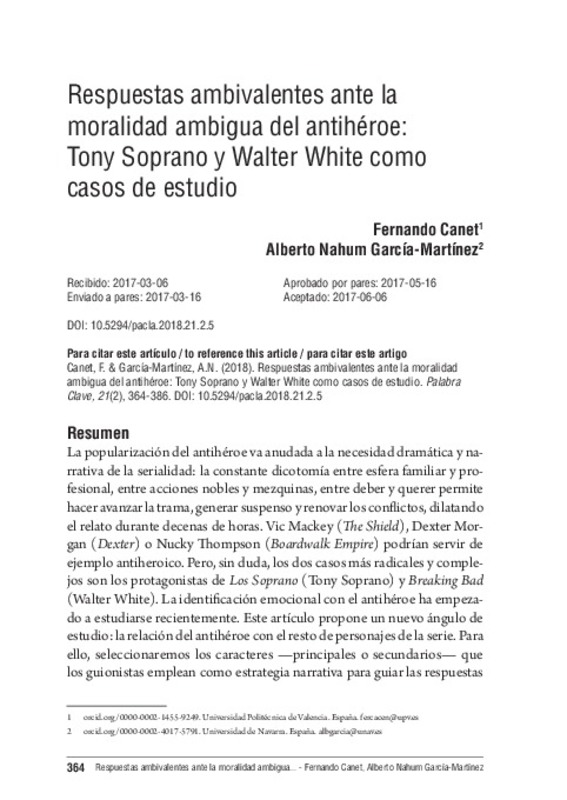JavaScript is disabled for your browser. Some features of this site may not work without it.
Buscar en RiuNet
Listar
Mi cuenta
Estadísticas
Ayuda RiuNet
Admin. UPV
Respuestas ambivalentes ante la moralidad ambigua del antihéroe: Tony Soprano y Walter White como casos de estudio
Mostrar el registro sencillo del ítem
Ficheros en el ítem
| dc.contributor.author | Canet Centellas, Fernando Javier
|
es_ES |
| dc.contributor.author | García-Martínez, Alberto Nahum
|
es_ES |
| dc.date.accessioned | 2019-09-14T20:01:34Z | |
| dc.date.available | 2019-09-14T20:01:34Z | |
| dc.date.issued | 2018 | es_ES |
| dc.identifier.issn | 0122-8285 | es_ES |
| dc.identifier.uri | http://hdl.handle.net/10251/125682 | |
| dc.description.abstract | [EN] The popularization of the antihero is linked to the dramatic and narrative need of seriality: the constant dichotomy between the family and professional spheres, between noble and petty actions, between duty and want, moves the story forward, generates suspense and renews conflicts, prolonging the story for dozens of hours. Vic Mackey (The Shield), Dexter Morgan (Dexter) or Nucky Thompson (Boardwalk Empire) could serve as an antihero example. However, the two most radical and complex cases are undoubtedly the protagonists of The Sopranos (Tony Soprano) and Breaking Bad (Walter White). The emotional affinity with the antihero has recently become the object of study. This paper proposes a new angle of study: the antihero's relationship with the rest of the characters in the series. For that purpose, we will select the characters - main or secondary - that the writers use as narrative strategy to guide the emotional and moral responses of the spectator the emotional and moral responses of the viewer in their particular relationship with the anti-hero. We will mainly focus on the reactions of these characters to the amoral behaviors of the antiheroes. We propose a methodology of textual analysis that, based on cognitivist theorists, will serve as a mechanism to better understand the construction of the anti-hero and to investigate the effects of authorial decisions on viewers. | es_ES |
| dc.description.abstract | [ES] La popularización del antihéroe va anudada a la necesidad dramática y narrativa de la serialidad: la constante dicotomía entre esfera familiar y profesional, entre acciones nobles y mezquinas, entre deber y querer permite hacer avanzar la trama, generar suspenso y renovar los conflictos, dilatando el relato durante decenas de horas. Vic Mackey (The Shield), Dexter Morgan (Dexter) o Nucky Thompson (Boardwalk Empire) podrían servir de ejemplo antiheroico. Pero, sin duda, los dos casos más radicales y complejos son los protagonistas de Los Soprano (Tony Soprano) y Breaking Bad (Walter White). La identificación emocional con el antihéroe ha empezado a estudiarse recientemente. Este artículo propone un nuevo ángulo de estudio: la relación del antihéroe con el resto de personajes de la serie. Para ello, seleccionaremos los caracteres ¿principales o secundarios¿ que los guionistas emplean como estrategia narrativa para guiar las respuestas emocionales y morales del espectador en su particular relación con el antihéroe. Principalmente, nos centraremos en las reacciones que estos personajes exhiben hacia las conductas amorales de los antihéroes. Proponemos una metodología de análisis textual que, partiendo de teóricos cognitivistas, nos servirá como mecanismo para entender mejor la construcción del antihéroe e indagar sobre los efectos que las decisiones autorales provocan en los espectadores | es_ES |
| dc.language | Español | es_ES |
| dc.publisher | Universidad de La Sabana | es_ES |
| dc.relation.ispartof | Palabra Clave | es_ES |
| dc.rights | Reserva de todos los derechos | es_ES |
| dc.subject | The Sopranos | es_ES |
| dc.subject | Breaking Bad | es_ES |
| dc.subject | Cognitive theory | es_ES |
| dc.subject | Television studies | es_ES |
| dc.subject | Character engagement | es_ES |
| dc.subject | Antihero narratives | es_ES |
| dc.subject | Moral emotions (Source: Unesco Thesaurus) | es_ES |
| dc.subject.classification | COMUNICACION AUDIOVISUAL Y PUBLICIDAD | es_ES |
| dc.title | Respuestas ambivalentes ante la moralidad ambigua del antihéroe: Tony Soprano y Walter White como casos de estudio | es_ES |
| dc.title.alternative | Ambivalent Responses to the Ambiguous Anti-Hero Morality: Tony Soprano and Walter White as a Case Study | es_ES |
| dc.type | Artículo | es_ES |
| dc.identifier.doi | 10.5294/pacla.2018.21.2.5 | es_ES |
| dc.rights.accessRights | Abierto | es_ES |
| dc.contributor.affiliation | Universitat Politècnica de València. Departamento de Comunicación Audiovisual, Documentación e Historia del Arte - Departament de Comunicació Audiovisual, Documentació i Història de l'Art | es_ES |
| dc.description.bibliographicCitation | Canet Centellas, FJ.; García-Martínez, AN. (2018). Respuestas ambivalentes ante la moralidad ambigua del antihéroe: Tony Soprano y Walter White como casos de estudio. Palabra Clave. 21(2):364-386. https://doi.org/10.5294/pacla.2018.21.2.5 | es_ES |
| dc.description.accrualMethod | S | es_ES |
| dc.relation.publisherversion | http://doi.org/10.5294/pacla.2018.21.2.5 | es_ES |
| dc.description.upvformatpinicio | 364 | es_ES |
| dc.description.upvformatpfin | 386 | es_ES |
| dc.type.version | info:eu-repo/semantics/publishedVersion | es_ES |
| dc.description.volume | 21 | es_ES |
| dc.description.issue | 2 | es_ES |
| dc.relation.pasarela | S\387027 | es_ES |








